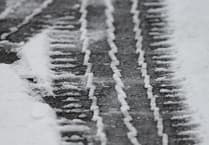The quick response and expert skills of RNLI lifeguards on Tenby's Castle Beach prevented a potential tragedy, after they saved two teenagers that became caught in a rip current and swept out to sea.
On Tuesday, August 26, stormy conditions hit the coast of west Wales following Hurricane Erin.
RNLI lifeguards across Pembrokeshire were forced to red flag a number of beaches as they were deemed as unsafe, due to the combination of big surf and wind which heightens the risk of rip currents.
Four teenagers walked down towards the water on the Paragon - the stretch of beach that connects Castle Beach and South Beach.
A patrolling RNLI lifeguard walked the 200m to reach the group and advised them against entering the water in that location, due to the big surf and strong rip currents. The lifeguard team had set up a red and yellow flagged swim zone on Castle Beach.
Shortly after returning to their post, the lifeguard spotted that two of the group had entered the water and appeared to be struggling.
Two lifeguards quickly equipped themselves with a rescue tube and a rescue board and made best speed to the casualties.
On approach, one of the teenagers could be heard shouting; ‘Help me please, I don’t want to die!’
The second had been dragged 150m out to sea and looked unresponsive, having been submerged for more than two minutes.
Carl Amos, RNLI Lifeguard Supervisor and one of the team who entered the water said: “We knew we needed to get to the unresponsive casualty as soon as possible. I swam out with fins and a rescue tube, whilst my colleague Liam Nash paddled out on a rescue board.
“The sets were rolling in heavily which made it tough to reach the casualties. I clipped the first casualty into the rescue tube and Liam got the unresponsive casualty onto his board.”
Both casualties were returned to shore where lifeguard Daisy Da Gama Howells was waiting to assess their condition and administer any casualty care first aid. The second casualty was struggling to breathe so was administered oxygen.
The lifeguards decided that the best way to extract the casualty from the beach was to strap him to a rescue board and carry him to the nearby Tenby RNLI Inshore Lifeboat Station to meet the ambulance. The paramedics confirmed that both casualties had water on the lungs and took them to hospital for further assessment.
During this incident, lifeguard Ffion Mabey was patrolling the red and yellow swim zone, keeping the beach safe for the 50+ people who were enjoying the surf.
Carl continued: “This incident is an example of why we give preventative advice and encourage people to swim between the red and yellow flags. The conditions on Tuesday were challenging due to the big waves and strong currents.
“I’m really proud of my team’s response, everyone put their training to use and effectively rescued two people in serious trouble in the water. We provided casualty care first aid and handed them over to the care of the paramedics. This was all whilst the beach remained operational with a busy swim zone to watch over.
“We’re reminding the public to choose a lifeguarded beach if they’re planning on going in the water in the final week of the summer holidays.
“Had we not been there to help on Tuesday, the outcome could’ve been very different for the casualties.”
Tirion Dowsett, RNLI Water Safety Delivery Support said: “It’s vitally important that the public are aware of the dangers that the sea can pose. On this occasion, the sea was rougher than usual which increases the likelihood and strength of rip currents.
“If you find yourself caught in a rip current, remember not to fight against it or you’ll get exhausted. If you can stand, wade don’t swim, or swim parallel to the shore until you’re free of the current, then head for the beach.
“If you find yourself unable to return to shore, remember to Float to Live. Preserve your energy by floating and then when you’re able, wave and shout for help.
“If you see anyone in difficulty along the coast, call 999 or 112 and ask for the Coastguard. RNLI lifeguards patrol from 10am-6pm and volunteer RNLI lifeboat crew are on call 24/7 to come to your aid.”





Comments
This article has no comments yet. Be the first to leave a comment.